Take Five with Chef Sarah Burchard on Breaking Down Pigs, Working at Top SF Restaurants and Starting Her Own BBQ Sauce Business
Sporting a girly ponytail, a sailor’s mouth, a wicked sense of humor, and a brand new tattoo of a large rooster on her left bicep, Sarah Burchard looks every bit the tough-girl chef.
She also knows her stuff. The 31-year-old former head chef of Barbacco in San Francisco, has cooked at some of the top restaurants in the Bay Area, holding her own even when she was the only woman in the kitchen. Cooking professionally has been something she’s wanted to do ever since she was a little girl, growing up in San Diego and then on the Peninsula, baking cookies with her Mom.
But two years ago, she decided to step away from that routine to start a company with her boyfriend, Spencer O’Meara, former chef of Paragon in San Francisco. S&S Brand (named for their first initials) makes small-batch gourmet barbecue rubs and sauces. They’re sold on their company Web site, as well as at 23 retail locations, including Bi-Rite Market in San Francisco, Willows Market in Menlo Park, the Pasta Shop in Oakland, and Robert’s Market in both Woodside and Portola Valley.
Enjoy a taste at the S&S Shack pop-up event, 6 p.m. to 9 p.m. April 16 at Mission Rock Resort in San Francisco. Burchard and O’Meara will be serving up rye soft pretzels with beer cheese sauce, bloody Mary shrimp “cocktails,” mini brisket bacon cheddar sliders, jerk chicken, hot links, “burnt ends” baked beans, corn bread with apricot jam and honey butter, Carolina vinegar slaw, PB&J donuts, and Jaegermeister ice cream shakes. Tickets are $40 each.
Recently, I had a chance to chat with Burchard about her first job (think ice cream), why she’s consumed by barbecue, and the nickname that Chef Staffan Terje of Perbacco bestowed upon her.
Q: You really knew since you were a kid that you wanted to be a chef?
A: I figured it out pretty quick. I loved to cook as a kid. My Mom taught me how to make the perfect grilled cheese. My Dad used to work at a fish market, so he taught me the appreciation of good seafood.
My first job was at Baskin-Robbins in Foster City. I was 15. A bunch of my friends from high school were working there, so it was like we ran the joint. It taught me a lot of responsibility. We closed down the shop at 10 p.m. every night. We did inventory. We counted the cash drawer. And I was making $4 an hour. It was good experience. We used to eat ice cream like it was going out of style. The owner let us eat however much we wanted, probably thinking we’d get sick of it. But we never did. Mint chip was my favorite.
After that, I worked at a deli in Foster City for four years. I loved it. I was in junior college for about a year, completely uninspired. It was around then that I decided to screw junior college and go to culinary school. I told my Mom, and she was like, ‘˜What?!’ She said she saved her entire life to send me to college, that I was going to only one college, so I better pick wisely.
Q: You chose the California Culinary Academy in San Francisco, which led to your stint at Viognier in San Mateo?
A: I did my internship there, and they kept me on after I graduated. That was also when ‘Kitchen Confidential’ came out. I read it and that sealed it. That was what I wanted to do for a living. I just love to cook. When I’m not cooking professionally, I’m at home, cooking. I love reading about it, learning about nutrition, everything about it. I love the camaraderie in the kitchen.
I was a line cook at Viognier under Chef Scott Giambastiani. I worked lunches, then started working nights after school was over. I was there three years. I worked every station there for a bit. I even did a stage with the pastry chef when I didn’t even work there, just to learn pastry, and I bartended there for awhile. That restaurant was probably one of the best I worked at in terms of being mentored. Then, I worked for awhile at 231 Ellsworth while I was working at Viognier, because as a line cook you have to work multiple jobs sometimes because you get s–t for money.
Q: Then, you went to work at San Francisco’s Rubicon when Chef Stuart Brioza and his wife, Pastry Chef Nicole Krasinsky, were there?
A: That was one of hardest places I’ve ever worked. Not because Stuart was a d–k or anything. He is a great chef. We had to make everything at our station from scratch every day. At a lot of places, you’ll make something in bulk to last you a few days so you have time for other things. You didn’t there. I used to get there much earlier than my shift started to try to be set up on time. I was like running the entire time. I hardly had time to pee.
On Wednesday, we’d be open for lunch. After the economy tanked, lunch service dropped, but they wanted to keep it for one day a week. On Tuesdays, we had to stay late to prep for lunch the next day. I’d come in early for Wednesday lunch and then have half the time I’d normally have to set up for dinner. It was very stressful. People were tired but nobody ever complained. I am really, really glad that I did it. It helped my speed and with my ability to multi-task.
Q: You became chef de cuisine next at Kingfish in San Francisco?
A: I was there a year and a half, then left two weeks before it closed. I didn’t want to go down with a sinking ship. Perbacco was about to open. Spencer worked with Staffan (Terje of Perbacco) at Scala’s in San Francisco and they had a good relationship. Spencer said, ‘Staffan is opening this place called Perbacco. Dude, you should get in on this. It’s going to be huge.’
But Staffan didn’t hire me, so I went to Annabelle’s Bar & Bistro in San Francisco. I had just started, when Staffan called me up and said he had an opening for a sous chef. I had only been there one or two weeks. I hated to do it, but Perbacco was my first choice, so I had to take it.
Q: What was Staffan like to work with?
A: He really gives you the tools to be successful. I fell in love with butchery and making salumi. Staffan allowed me to take that program over at Perbacco. He called me the ‘salami mommy.’ (laughs)
That was the highlight of working there — getting to make the salumi and breaking down whole pigs. We’d sometimes get in two whole pigs a week. There would be an entire week of production from the time you got the pig to when all the meat was hung for curing. It’s really fun, and you zen out doing it. A lot of it, I did by myself. Working with really big pigs all by yourself is an undertaking that can take a whole day or even longer. Pigs are heavy. It’s hard on your muscles, schlepping these big hind quarters around, and cutting them up with a saw. It was tough work.
Q: When Barbacco opened, you became its chef de cuisine?
A: I started working on it before it opened — testing recipes, doing food costs, etc. It was one of the hardest things I’ve ever done and also one of the most rewarding. The food was awesome — more rustic, more like comfort food. It spoke to me.
Q: But after a year and a half you walked away from all of that. Why?
A: I was getting pretty burned out and wanted to take a break. Spencer and I have aspirations of opening our own place someday. We started the barbecue sauce company three years ago as a baby step.
Q: Why barbecue of all things?
A: Spencer was born in North Carolina. All his family lives there, so we take annual trips there. At Paragon, he created a barbecue night every Wednesday, where he’d do pulled pork. He had a really good following for it. We thought, let’s bottle that stuff up and sell it.
We went on a barbecue trip from Kansas City to St. Louis to Memphis to Dallas, Austin and San Antonio. We hit 16 barbecue shacks along the way. We did extensive research. When we eventually do a restaurant of our own, we want it to be casual, and barbecue will be involved.
Q: What’s been the biggest challenge about starting your own business?
A: It’s not easy to be a small business in San Francisco. It’s really expensive. You have to have permits and licenses for everything, and there are fees for all of that. Taxes are expensive. And just learning how to be a sales person has been hard. As a chef you’re in the kitchen and you have the front of house to sell the food for you. Now, you have to tell your whole story and your brand in five minutes when you walk into a grocery store. It took us at least six months to get our spiel down. You’re out of your comfort zone; you just try to be yourself and speak from the heart and tell the truth.
Q: What’s the best part?
A: Putting it all together has been fun. I built the Web site. My brother designed our logo. Friends in our neighborhood do the photography for us. A couple friends who do marketing also gave us marketing ideas. Some people have helped us bottle sauces. It’s not like we pay them because we can’t afford to. They just did it out of the kindness of their heart. That’s been the best part. Seeing our products on the shelves of grocery stores is pretty cool, too.
Q: How did you and Spencer meet?
A: We met at Kingfish in San Francisco. It was right around the corner from Paragon. We used to borrow things from each other, and hang out each other’s bar.
Q: So, who’s the better chef? You? Or Spencer?
A: I can’t answer that. (laughs) I think we’re both amazing. I don’t think either is better than the other. We both have strengths and weaknesses.
I do most of the cooking at home, but we do develop recipes together. Sometimes we disagree on the ways things should be done, but in the end we know how it should taste. So, however we get there is fine. He has an amazing palate. If we have a big prep list, we’re good at dividing and conquering, and banging it out quickly and efficiently. We’re both passionate about what we do. It’s enjoyable for us to get in there and tweak a dish. Sometimes, I get frustrated too quickly if it doesn’t work out. I’ll say, ‘Just f–k it; let’s do something else.’ But he will do it over and over until he gets it right.
Q: For a long time, women had a hard time in a professional kitchen, what with it historically being a man’s domain. Did you ever find that the case?
A: It never was like that for me. It is sometimes for people, but only if you have someone on staff who is disrespectful in general. I got pretty lucky. I was lucky to work with people with good hearts, and who saw me work hard and respected that.
Women help balance out the testosterone in the kitchen a little bit. Most of the women I worked with are pretty hard-core. They all drink and smoke, and can hang with the guys.
Q: Do you miss working in a restaurant kitchen every day?
A: I haven’t had a chance to miss it that much. I was the pastry chef at Paragon for eight months. I’ve also consulted for a few different restaurants, including Southie in Oakland and Piazza D’Angelo in Mill Valley.
Q: If you and Spencer could dine with any chef (dead or alive), who would it be?
A: Anthony Bourdain because he’s awesome.
Q: What’s the one food or ingredient you most love to eat?
A: Spaghetti with meat sauce.
Q: The food or ingredient that you most hate?
A: I’m not a picky eater, so that’s hard. I am allergic to shellfish. But other than that, I’m open to whatever.
Q: Your guilty food pleasure you hate to admit liking?
A: Cheez-Its. With a cold beer.
Q: If someone named a dish after you, one that really captured your personality, what would it be?
A: Kimchi. Because it’s sour and spicy. (laughs)
More Take Five Interviews with Women in the Food Industry: Chef Duskie Estes of Zazu Restaurant & Farm
And: Chef Cat Cora
And: Chef Jennie Lorenzo, Formerly of the Fifth Floor
And: Chef Dominique Crenn of Atelier Crenn
And: Sara Moulton

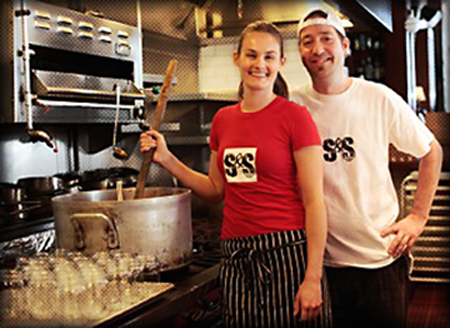
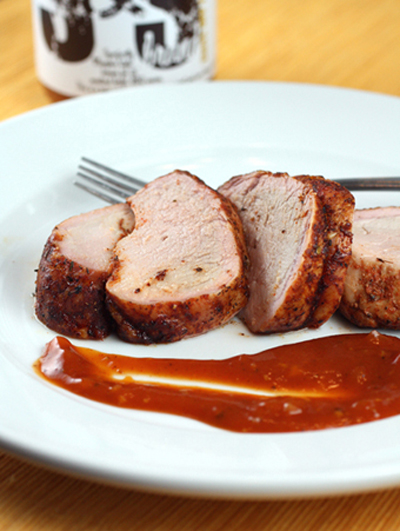
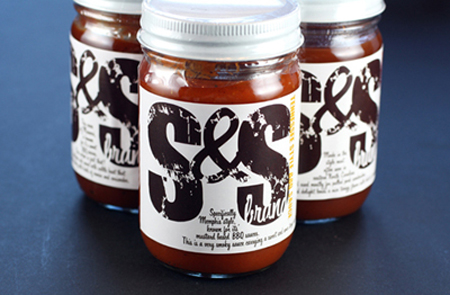
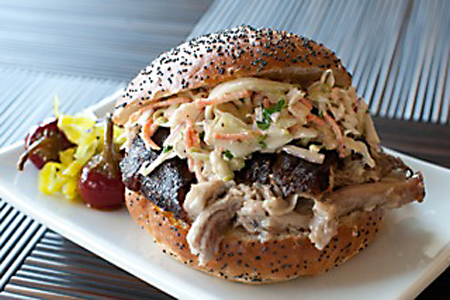
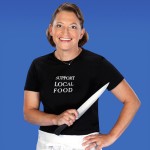

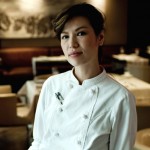
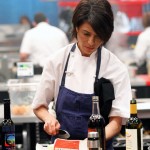
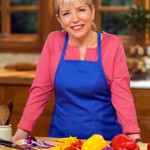
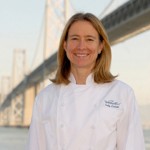
What a great interview & what mouthwatering pics too! Good for that woman! Waw, even!
Nice to see a young, spunky, talented gal in the food scene. Good for her!
Wonderful interview! Being a chef is such hard work, and you have to be tough and dedicated to be successful. Such long hours, too. That BBQ trip sounds like fun. My wife and I have often thought we should take a pie and BBQ tour of the US, and probably will someday.
The S&S spice rubs have become an essential item in our pantry and kitchen. The poultry rub will transform your basic oven roasted chicken into something spectacular.
It’s very interesting to see her path through a series of different restaurants and ending up making a BBQ sauce. Sometimes it’s a strange path to get to our passion. Enjoyed this interview!